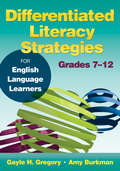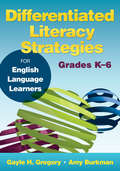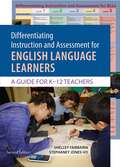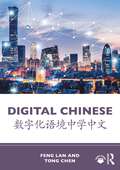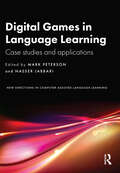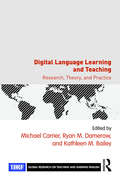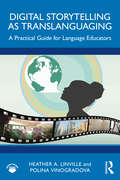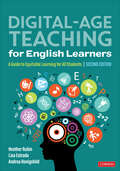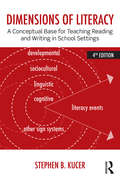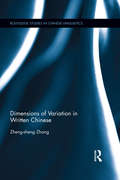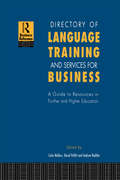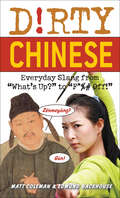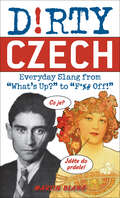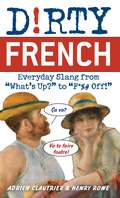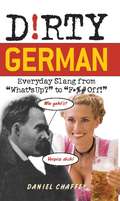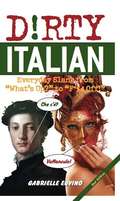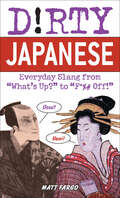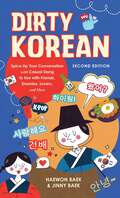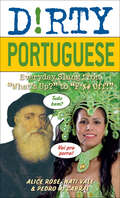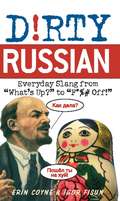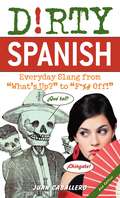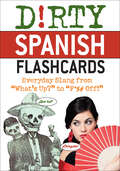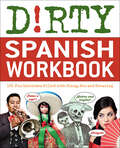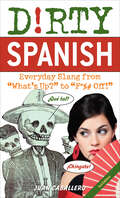- Table View
- List View
Differentiated Literacy Strategies for English Language Learners, Grades 7–12
by Gayle H. Gregory Amy J. Burkman100 ways to keep adolescent ELLs engaged This versatile handbook is for middle school and high school educators who need to differentiate literacy instruction for adolescent ELL students at various stages of literacy competency. Adapted from the highly successful Differentiated Literacy Strategies for Student Growth and Achievement in Grades 7–12, the authors use brain-based strategies and texts that appeal to older learners who may have had interrupted formal education or come from newly arrived immigrant populations. More than 100 hands-on tools help teachers develop students’ competencies in: Content areas, including vocabulary, concept attainment, and comprehension Technology, such as information searching, evaluation, and synthesis Creative applications and 21st century skills ·
Differentiated Literacy Strategies for English Language Learners, Grades K–6
by Gayle H. Gregory Amy J. BurkmanEffective ways to help ELLs excel The key to successfully teaching English learners is focusing on literacy. Adapted from the highly successful Differentiated Literacy Strategies for Student Growth and Achievement in Grades K–6, this book provides a wealth of practical literacy strategies tailored for students who have had interrupted formal education or come from newly arrived immigrant populations. Teachers will find an instructional and assessment framework designed to promote these critical competencies: Functional literacy in phonics, spelling, and reading; Content-area literacy for vocabulary, concept attainment, and comprehension; Technological literacy for information searching, evaluation, and synthesis; Innovative literacy for creativity, growth, and lifelong learning.
Differentiating Instruction and Assessment for English Language Learners: A Guide for K-12 Teachers
by Stephaney Jones-Vo Shelley FairbairnThe notion that we must explicitly teach language within all academic classes is gaining ground today. . . . This guide is packed with ideas for purposeful and differentiated language instruction and assessment that can be applied in most content classrooms. . . . I predict this second edition will be as popular with teachers facing the challenges of educating ELLs as it will be in university teacher pre-service programs. As teachers . . . make use of the strategies, they will begin to share the excitement I felt at seeing a guide that addresses language differentiation for ELLs.Tim Boals, Executive Director, WIDA Consortium <p><p>What's New to the Second Edition?- Updated student demographics that show the range of English language learners (ELLs) we find in the United States, with attention to home language, prior schooling, and cultural background- A new chapter on teaching content and language to diverse learners that: aligns with new learning standards (e.g., Next Generation, College- and Career-Ready, Common Core) and language development progressions (e.g., WIDA, ELPA21, NY, CA, TX); prepares teachers to teach language and literacy across content areas; examines academic language at the word, sentence, and discourse levels.- An improved differentiating instruction and assessment template that draws teachers' attention to the language demands of content-area instruction- Stronger emphasis on teacher collaboration, leadership, and innovative teacher-directed approaches to professional learning- Includes an updated quick-reference chart of differentiation strategies by ELD levels for teachers' classroom use.
Digital Chinese: 数字化语境中学中文
by Feng Lan Tong ChenDigital Chinese integrates situational and communicative methods to provide practical language skills and a deep understanding of the digital world.Digital Chinese is a pioneering textbook designed to meet the dual needs of Chinese language proficiency and digital literacy. Each of the ten chapters focuses on a specific theme, from social media and online shopping to AI chatbots, reflecting the most engaging aspects of contemporary Chinese digital life. Each lesson features a narrative and a dialogue that simulate real-life interactions, accompanied by vocabulary lists covering specialized digital terms and everyday words. The textbook also includes audio recordings (www.routledge.com/9781032863818) to aid pronunciation and listening comprehension. Grammatical points are clearly explained with examples, and exercises in reading, speaking, writing, and translation reinforce language acquisition.Tailored for Chinese learners at the intermediate-high level and above, this textbook equips students with the tools to navigate and engage with China's vibrant online ecosystem. By combining traditional Chinese language education with insights into China's dynamic digital landscape, Digital Chinese is an essential resource for students and educators seeking to understand the intersection of language, technology, and society in contemporary China.
Digital Games in Language Learning: Case Studies and Applications (New Directions in Computer Assisted Language Learning)
by Mark PetersonThis edited volume provides a comprehensive overview of contemporary research into the application of digital games in second and foreign language teaching and learning. As the use of digital games in foreign language education continues to expand, there is a need for publications that provide a window into recent innovations in this increasingly influential area of language education. This volume is wide ranging in scope incorporating both theory and practice and includes contributions from authorities in the field. Areas covered include research reviews and a range of case studies conducted in a variety of international contexts. This volume represents an essential guide to developments in this field and will have wide appeal to students, language educators, game and instructional designers.
Digital Language Learning and Teaching: Research, Theory, and Practice (Global Research on Teaching and Learning English)
by Kathleen M. Bailey Michael Carrier Ryan M. DamerowThis carefully balanced set of studies and practitioner research projects carried out in various learning contexts around the world highlights cutting-edge research in the use of digital learning technologies in language classrooms and in online learning. Providing an overview of recent developments in the application of educational technology to language learning and teaching, it looks at the experience of researchers and practitioners in both formal and informal (self-study) learning contexts, bringing readers up to date with this rapidly changing field and the latest developments in research, theory, and practice at both classroom and education system levels.
Digital Storytelling as Translanguaging: A Practical Guide for Language Educators
by Heather A. Linville Polina VinogradovaThis innovative, accessible book is an introduction to using digital storytelling in language teaching, with a focus on English as an Additional Language (EAL) instruction. Linville and Vinogradova provide a clear framework that addresses translanguaging and multimodal meaning making in teaching multilingual learners (MLs) through use of digital storytelling.This book provides detailed guidance on how to incorporate digital storytelling into language teaching, building on recent developments in the fields of TESOL and language education that position multilingualism and multiliteracies as important components of any language instruction. Through this text and accompanying activities, readers will understand how to work with MLs to create multimodal digital texts. This book offers an easy-to-follow, step-by-step process for language educators to follow to support MLs’ digital storytelling projects in any EAL classroom. Featured digital storytelling projects from EAL practitioners in various contexts, as well as multiple examples and resources, are included for each stage of the process, always grounded in contemporary TESOL theories (e.g., critical pedagogy, culturally responsive teaching, translanguaging, and a pedagogy of multiliteracies). This framework supports the development of multilingualism and multiliteracies and can be adapted by educators of other world languages for any language education setting.Grounded in contemporary TESOL theories, this book is an essential text for courses on technology in TESOL and TESOL methods courses, as well as for language educators.
Digital-Age Teaching for English Learners: A Guide to Equitable Learning for All Students
by Lisa M. Estrada Andrea Honigsfeld Heather RubinBridge the Digital Divide with Research-Informed Technology Models Since the first edition of this bestselling resource many schools are still striving to close the digital divide and bridge the opportunity gap for historically marginalized students, including English learners. And the need for technology-infused lessons specifically aligned for English learners is even more critically needed. Building from significant developments in education policy, research, and remote learning innovations, this newly revised edition offers unique ways to bridge the digital divide that disproportionally affects culturally and linguistically diverse learners. Designed to support equitable access to engaging and enriching digital-age education opportunities for English learners, this book includes Research-informed and evidence-based technology integration models and instructional strategies Sample lesson ideas, including learning targets for activating students’ prior knowledge while promoting engagement and collaboration Tips for fostering collaborative practices with colleagues Vignettes from educators incorporating technology in creative ways Targeted questions to facilitate discussions about English language development methodology Complete with supplementary tools and resources, this guide provides all of the methodology resources needed to bridge the digital divide and promote learning success for all students.
Digital-Age Teaching for English Learners: A Guide to Equitable Learning for All Students
by Lisa M. Estrada Andrea Honigsfeld Heather RubinBridge the Digital Divide with Research-Informed Technology Models Since the first edition of this bestselling resource many schools are still striving to close the digital divide and bridge the opportunity gap for historically marginalized students, including English learners. And the need for technology-infused lessons specifically aligned for English learners is even more critically needed. Building from significant developments in education policy, research, and remote learning innovations, this newly revised edition offers unique ways to bridge the digital divide that disproportionally affects culturally and linguistically diverse learners. Designed to support equitable access to engaging and enriching digital-age education opportunities for English learners, this book includes Research-informed and evidence-based technology integration models and instructional strategies Sample lesson ideas, including learning targets for activating students’ prior knowledge while promoting engagement and collaboration Tips for fostering collaborative practices with colleagues Vignettes from educators incorporating technology in creative ways Targeted questions to facilitate discussions about English language development methodology Complete with supplementary tools and resources, this guide provides all of the methodology resources needed to bridge the digital divide and promote learning success for all students.
Dimensions of Literacy: A Conceptual Base for Teaching Reading and Writing in School Settings
by Stephen B. KucerThis popular text, now in its fourth edition, "unpacks" the various dimensions of literacy--linguistic and other sign systems; cognitive; sociocultural; and developmental--and at the same time accounts for the interrelationships among them. Distinguished by its examination of literacy from a multidimensional and interdisciplinary perspective, it provides a strong conceptual foundation upon which literacy curriculum and instruction in school settings can be grounded. Linking theory and research to practice in an understandable, user-friendly manner, the text provides in-depth coverage of the dimensions of literacy, includes demonstrations and "hands-on" activities, examines authentic reading and writing events that reflect key concepts, and summarizes the concepts in tables and figures. Changes in the Fourth Edition* Addresses academic language, new literacies/multiliteracies, and their relationship to literacy learning* More fully develops the developmental dimension of literacy in separate chapters on adult mediation and learner construction* Expands the discussion of multimodal literacies* Extends and integrates the discussion of bilingualism and biliteracy throughout the text* Integrates instructional implications more fully throughout
Dimensions of Variation in Written Chinese (Routledge Studies In Chinese Linguistics Ser.)
by Zheng-Sheng ZhangDimensions of Variation in Written Chinese uses a corpus-based, multi-dimensional model to account for variation in written Chinese. Using statistical method and two-dimensional visual representation, it provides a concrete and objective view of the internal variation in written Chinese. This book is a timely work that addresses the growing interest in quantitative genre analysis and how knowledge thus gained can contribute to the teaching as well as understanding of the Chinese language. Zheng-sheng Zhang is Professor of Chinese at San Diego State University. He has been a long-term editor of the Journal of Chinese Language teachers Association (now known as Chinese as a Second Language) and is a respected researcher in the field of Chinese linguistics.
Directory of Language Training and Services for Business: A Guide to Resources in Further and Higher Education
by Colin Mellors David Pollitt Andrew RadtkeLanguage acquisition and training is a key concern for businesses of all types and sizes. This Directory is an invaluable resource for anyone needing information on language training for business. The Directory also provides information on services for business such as translation and interpreting. Ordered A-Z by institution, the Directory will enable speedy identification of providers from a bank of over 400 institutional and other contacts across the UK.
Dirty Chinese: Everyday Slang from "What's Up?" to "F*%# Off!" (Dirty Everyday Slang)
by Matt Coleman Edmund BackhouseFoul your mouth—while expanding your Mandarin vocabulary—with a guide to the phrases that could get you a laugh . . . or a punch in the face.Next time you’re traveling or just chattin’ in Chinese with your friends, drop the textbook formality and bust out with expressions they never teach you in school, including:Cool slangFunny insultsExplicit sex termsRaw swear wordsDirty Chinese teaches the casual expressions heard every day on the streets of China:What’s up? Zenmeyàng?Fuck it, let’s party. Qù tama, zánmen chuqù feng ba.Who farted? Shéi fàng de pì?Wanna try doggy-style? Yàobù zánliar shìshì gou cào shì?Son of a bitch! Gouniángyang de!I’m getting smashed. Wo ganjué heduo le.I can’t eat this shit! Wo chi bù xià qù!
Dirty Czech: Everyday Slang from "What's Up?" to "F*%# Off!" (Dirty Everyday Slang Ser.)
by Martin BlahaGET D!RTYNext time you're traveling or just chattin' in Czech with your friends, drop the textbook formality and bust out with expressions they never teach you in school, including: Cool slang Funny insults Explicit sex terms Raw swear wordsDirty Czech teaches the casual expressions heard every day on the streets of the Czech Republic:What's up? - Co je?I adore your small titties - Zboznuju tvoje kuzlatka.I gotta take a leak. - Musim se vymocit.Your team sucks ass! - Tvuj tym je na hovno!Drop Dead you freak! - Chcipni, ty zrudo!I'm faded. - Jsem namazenej.Are you as horny as I am? - Jsi taky tak nadrzenej
Dirty French: Everyday Slang from (Dirty Everyday Slang Ser.)
by Henry Rowe Adrien ClautrierGET D!RTYNext time you're traveling or just chattin' in French with your friends, drop the textbook formality and bust out with expressions they never teach you in school, including: Cool slang Funny insults Explicit sex terms Raw swear wordsDirty French teaches the casual expressions heard every day on the streets of France: What's up?Ça va? He's totally hot.Il est un gravure de mode. That brie smells funky.Ce brie sent putain de drôle. I'm gonna get ripped!Je vais me fracasser! I gotta piss.Je dois pisser. The ref is fucking asshole.L'arbitre est un gros enaelé! Wanna try doggy-style?Veux-tu faire l'amour en levrette?
Dirty German
by Daniel ChaffeyGET D!RTYNext time you're traveling or just chattin' in German with your friends, drop the textbook formality and bust out with expressions they never teach you in school, including: Cool slang Funny insults Explicit sex terms Raw swear wordsDirty German teaches the casual expressions heard every day on the streets of Germany: What's up?Wie geht's? I'm smashed.Ich bin total angeschickert. Fuckin' Munich fans.Scheiß München Fans. That shit reeks.Das riecht aber übel. I wanna shag ass.Ich will abhauen. What a complete asshole.Was für ein Arschloch. Dude, you're built like Arnold!Mensch, du bist der Arnie!
Dirty Italian
by Gabrielle EuvinoGET D!IRTY! Next time you're in Italy or just chattin' in Italian with your friends, drop the textbook formality and bust out with expressions they never teach you in school, including:* Cool slang* Funny insults* Explicit sex terms* Raw swear wordsDirty Italian teaches the casual expressions heard every day on the streets of Italy:What's up? Che c'è? She's got killer legs. Le ha le gambe da morire. Get the fuck outta here! Sparisci! I'm so plastered. Sono demolito. I gotta piss. Devo pisciare. Your team sucks! La vostra squadra fa schifo! Wanna have a quickie? Facciamo una sveltina?
Dirty Japanese: Everyday Slang from "What's Up?" to "F*%# Off!" (Dirty Everyday Slang)
by Matt FargoLearn cool slang, funny insults and all the words they didn’t teach you in class with this comprehensive guide to dirty Japanese.You’ve taken Japanese lessons and learned all kinds of useful phrases. You know how to order dinner, get directions, and ask for the bathroom. But what happens when it’s time to drop the textbook formality? To really know a language, you need to know it’s bad words, too. You need Dirty Japanese.From common slang and insulting curses to explicit sexual expressions, this volume teaches the kind of Japanese heard heard every day on the streets from Tokyo to Kyoto from “What’s up?” (Ossu?) to “I’m smashed,” (Beron beron ni nattekita.).
Dirty Korean: Spice Up Your Conversation with Casual Slang to Use with Friends, Enemies, Lovers, and More
by HaewonGrace Baek Jinny BaekDive into the vibrant world of Dirty Korean, your go-to handbook packed with essential phrases for speaking like a native, making Korean friends, and navigating South Korea like a pro.Korean language–learning textbooks can be helpful, but when it comes to really immersing yourself in culture and learning how native Koreans speak in their daily lives, textbooks often fall short. That&’s where Dirty Korean comes in. In this updated second edition, you&’ll learn all the latest slang Korea has to offer so that the next time you travel to Korea, you can chat casually with your friends, impress your new date, and join in on all the juicy gossip. So get ready to drop the textbook formality and bust out expressions they never teach you in school, including: Cool slang like Bural chingu Funny insults like Doenjangnyeo Explicit sex terms like Na ssalkeogata! Swear words like Dakchyeo! And so much more! Whether you're charming oppas or winning over gracious eonnis, Dirty Korean is your key to unlocking the cultural richness of South Korea.
Dirty Portuguese: Everyday Slang from "What's Up?" to "F*%# Off!" (Dirty Everyday Slang)
by Pedro A Cabral Alice Rose Nati ValeLearn cool slang, funny insults and all the words they didn’t teach you in class with this comprehensive guide to dirty Portuguese.You’ve taken Portuguese lessons and learned all kinds of useful phrases. You know how to order dinner, get directions, and ask for the bathroom. But what happens when it’s time to drop the textbook formality? To really know a language, you need to know its bad words, too. You need Dirty Portuguese.From common slang and insulting curses to explicit sexual expressions, this volume teaches the kind of Portuguese heard every day on the streets of Brazil. Learn to sound like a native speaker with phrases like:What’s up? — Tudo bem?Are those fake boobs? — Você tem silicone no peito?I need to take a piss. — Preciso mijar.That goalie is so weak. — Esse goleiro é uma mãe.Shit’s about to go down! — O coro vai comer!I’m smashed. — Tô bebum.Let’s fuck like animals. — Vamos trepar como animais.
Dirty Russian
by Igor Fisun Erin CoyneGET D!RTYNext time you're traveling or just chattin' in Russia with your friends, drop the textbook formality and bust out with expressions they never teach you in school, including: Cool slang Funny insults Explicit sex terms Raw swear words Dirty Russian teaches the casual expressions heard every day on the streets of Russia:What's up?kak de-LA?I really gotta piss.mnye O-chen NA-do pos-SAT. Damn, you fine!blin, nu ti i shi-KAR-nii! Let's have an orgy.da-VAI u-STRO-im OR-gi-yu. This is crappy vodka.d-ta VOD-ka khre-NO-va-ya. Let's go get hammered.poi-DYOM bukh-NYOM. I'm gonna own you, bitch!ya te-BYA VI-ye-blyu!
Dirty Spanish
by Juan CaballeroGET D!RTY!Next time you're traveling or just chattin' in Spanish with your friends, drop the textbook formality and bust out with expressions they never teach you in school, including: cool slang funny insults explicit sex terms raw swear wordsDirty Spanish teaches the casual expressions heard every day on the streets of Spain and Latin America: What's up? ¿Qué tal? I'm shitfaced. Estoy mamado. Check out all the hotties! ¡Mírale las bomboncitas! Will you suck me off? ¿Me lo chuparías? I have the runs. Yo tengo un chorrillo. What a motherfucker! ¡Qué conchesuma! That forward is legit. Es chévere ese delantero.
Dirty Spanish Flash Cards: Everyday Slang From "What's Up?" to "F*%# Off!" (Dirty Everyday Slang)
by Juan CaballeroQuickly memorize the dirty words and off-color expressions not taught in any Spanish class. Flashcards aren’t just for developing an SAT vocabulary. With Dirty Spanish Flashcards, readers can quickly master the bawdy Spanish terms never seen in a textbook. From casual greetings and cutting put-downs to explicit sex terms and filthy swear words, each flashcard presents a hip vocabulary word and example sentence on one side and an English definition on the reverse. It’s a fun and fast way to learn the real Spanish spoken daily on the streets of Latin America and Spain. This deck is designed for readers to master Spanish and engage people in a foreign language on an entirely new level. With phrases like “I’m plastered!” and “Let’s hit the clubs!”, readers will be making new friends in no time. In addition to pickup lines and insults, the deck contains other contemporary slang like globos, literally “globes” but which can also refer to a woman’s personal endowments; or malparido, which means “badly born,” but can be used to call someone an a**hole.Featuring:• Cool slang• Funny insults• Explicit sex terms• Raw swear words
Dirty Spanish Workbook: 101 Fun Exercises Filled with Slang, Sex and Swearing (Dirty Everyday Slang Ser.)
by Nd BLEARN SPANISH THE D!RTY WAY! Classroom workbooks teach conjugation with lame verbs-I walk, you walk, he walks. Eff that. Wouldn't you rather be learning I hook up, you hook up, we hook up (Yo ligo, tu ligas, nosotros ligamos)? This book teaches you Spanish using the expressions you really want to learn including cool slang, funny insults, raw swear words and explicit sex terms. Packed with fun stuff they don't teach in school, Dirty Spanish Workbook includes:* Sample Dialogues for Picking Up Sexy Locals* Labeled Illustrations of Hot Spots on a Bangin' Body* Conjugation Exercises on Conjugating* Word Search for Dancing, Clubbing and Partying Terms* Fill-in-the-Blank Sentences to Describe a Hottie* Multiple Choice Quizzes featuring Drunk, Wasted and Stoned Vocabulary
Dirty Spanish: Everyday Slang from "What's Up?" to "F*%# Off!" (Dirty Everyday Slang)
by Juan CaballeroLearn how to swear like a native speaker with this highly improper phrasebook! Learn the slang words, modern phrases, and curses they never taught you in Spanish class with this hilariously improper English-Spanish phrasebook. You already know enough Spanish to get by, but you want to be able to tell those inside jokes, greet your friends in a laid-back manner, and casually pick someone up at a bar. From &“What&’s up?&” to &“Wanna go home with me?&” Dirty Spanish will teach you how to speak like you&’re a regular on the streets of Madrid or Mexico City or Buenos Aires. But you&’ll also discover material that goes beyond a traditional phrasebook, including: *Hilarious insults *Provocative facts *Explicit swear words *Themed Spanish cocktails *and more! Next time you&’re traveling to Spain, Mexico, or South America—or just practicing your conversational Spanish—drop the textbook formality, and get dirty!
